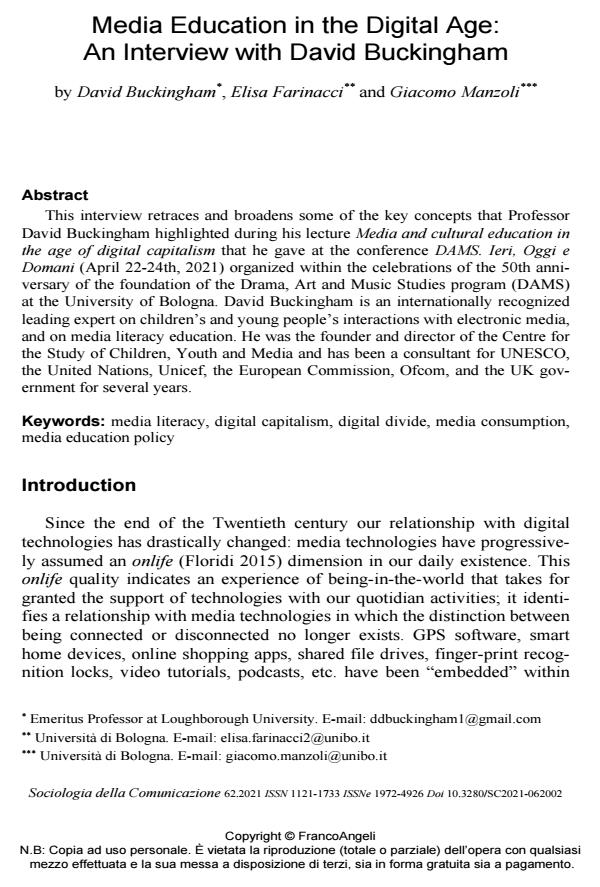Media Education in the Digital Age: An Interview with David Buckingham
Titolo Rivista SOCIOLOGIA DELLA COMUNICAZIONE
Autori/Curatori David Buckingham, Elisa Farinacci, Giacomo Manzoli
Anno di pubblicazione 2021 Fascicolo 2021/62
Lingua Inglese Numero pagine 16 P. 17-32 Dimensione file 299 KB
DOI 10.3280/SC2021-062002
Il DOI è il codice a barre della proprietà intellettuale: per saperne di più
clicca qui
Qui sotto puoi vedere in anteprima la prima pagina di questo articolo.
Se questo articolo ti interessa, lo puoi acquistare (e scaricare in formato pdf) seguendo le facili indicazioni per acquistare il download credit. Acquista Download Credits per scaricare questo Articolo in formato PDF

FrancoAngeli è membro della Publishers International Linking Association, Inc (PILA)associazione indipendente e non profit per facilitare (attraverso i servizi tecnologici implementati da CrossRef.org) l’accesso degli studiosi ai contenuti digitali nelle pubblicazioni professionali e scientifiche
This interview retraces and broadens some of the key concepts that Professor David Buckingham highlighted during his lecture Media and cultural education in the age of digital capitalism that he gave at the conference DAMS. Ieri, Oggi e Domani (April 22-24th, 2021) organized within the celebrations of the 50th anniversary of the foundation of the Drama, Art and Music Studies program (DAMS) at the University of Bologna. David Buckingham is an internationally recognized leading expert on children’s and young people’s interactions with electronic media, and on media literacy education. He was the founder and director of the Centre for the Study of Children, Youth and Media and has been a consultant for UNESCO, the United Nations, Unicef, the European Commission, Ofcom, and the UK government for several years.
Parole chiave:media literacy, digital capitalism, digital divide, media consumption, media education policy
- Higher Education Learning Methodologies and Technologies Online Alessandra La Marca, Elif Gulbay, Ylenia Falzone, pp.471 (ISBN:978-3-031-29799-1)
David Buckingham, Elisa Farinacci, Giacomo Manzoli, Media Education in the Digital Age: An Interview with David Buckingham in "SOCIOLOGIA DELLA COMUNICAZIONE " 62/2021, pp 17-32, DOI: 10.3280/SC2021-062002